Beth Allison Barr is reclaiming the role of the pastor’s wife. With honesty and hope, she invites the Church to think differently about women in leadership, says our reviewer

If a survey were conducted among Christians to ask how often – or how deeply – they consider the role of a pastor’s wife, the likely answer would be never. Such is the nature of the role itself. As Beth Allison Barr puts it in Becoming the Pastor’s Wife (Baker Publishing Group), these women often function merely as the: “support staff for male pastors.”
In this sharp and insightful book, Barr deconstructs the role of the pastor’s wife and argues that a woman’s call to ministry should not automatically relegate her to being ‘just’ the pastor’s wife, as doing so limits her agency and leadership within the Church.
Barr traces the historical roots of how Christian women gained a new and significant leadership position in the form of the pastor’s wife – but argues that this gain came at a cost, one far greater than we may yet realise.
She draws from a wide range of sources - including, most importantly, the Bible. She cites the New Testament example of Prisca and Aquila to argue that it is entirely possible for the more visible and active partner in a ministry couple to be the wife. In fact, she suggests Aquila may well be the first recorded example of “a minister’s husband.”
Barr argues that a wife need not be relegated to the background in ministry partnerships. She also notes that the Bible’s silence on the wives of figures such as Peter or other male leaders shouldn’t be seen as significant - the issue, she says, is that we’ve chosen to make it significant.
Beyond the Bible, Barr draws on the wider religious context in which early Christianity emerged - specifically, a world already familiar with women in positions of spiritual authority. She cites the Romans as one such example, noting that: “women were not simply tools of their male priestly hierarchy, but rather…autonomous leaders who did not need the supervision of men.” Reflecting on her own visit to the Priscilla Catacombs, she writes: “it casts enough doubt to undermine the claim that male-only leadership is a matter of ‘fundamental biblical authority.’”
Drawing on personal anecdotes, stories from other pastors’ wives, and comparisons with the experiences of Black pastors’ wives, she critiques the limitations placed on women under complementarianism - defined as a patriarchal system rooted in white evangelicalism that uses the Bible to justify privileging male authority. “We have told women their best path into ministry is to literally follow behind men,” she writes.
We have told women their best path into ministry is to literally follow behind men
Barr interrogates how we recognise pastoral work within systems of power, hierarchy and gender and the framing of women pastors as “exceptional,” which only reinforces the fiction that women are not truly pastors. She also tackles the long-standing vilification of female sexuality. Relentless in her deconstruction of modern expectations surrounding the pastor’s wife, Barr challenges the (flawed) teaching that her ministry should be to: “center her life, from home to church, on her husband.”
What makes Barr’s unflinching critique all the more compelling is her insistence that she has loved being a pastor’s wife. She makes clear that her aim in Becoming the Pastor’s Wife is not to discredit the role or the women who faithfully inhabit it, but to examine its historical development - particularly within US evangelicalism and the Southern Baptist Convention - and how it has shaped attitudes toward women in ministry. This is a critique and, perhaps, a call to action - not a condemnation. A distinction worth emphasising. On balance, Barr achieves what she sets out to do. Readers are invited, even encouraged, to question their assumptions about the role of the pastor’s wife, and are given the tools to do so. More than that, Barr offers something rare in such critiques: hope.
There’s a revolutionary moment during an episode of the TV series Designing Women, which Barr highlights as encapsulating, in under 30 minutes, much of the Southern Baptist Convention’s debate around women in ministry. In the episode, a character named Bernice delivers a striking rebuke to her pastor: “Just remember,” she says to Reverend Nunn, “after Christ was crucified on the cross, and all his men had gone home, it was women who stayed until the bitter end. And it was women who first heralded the news of his resurrection. So just put that in your pulpit and smoke it.”



































No comments yet